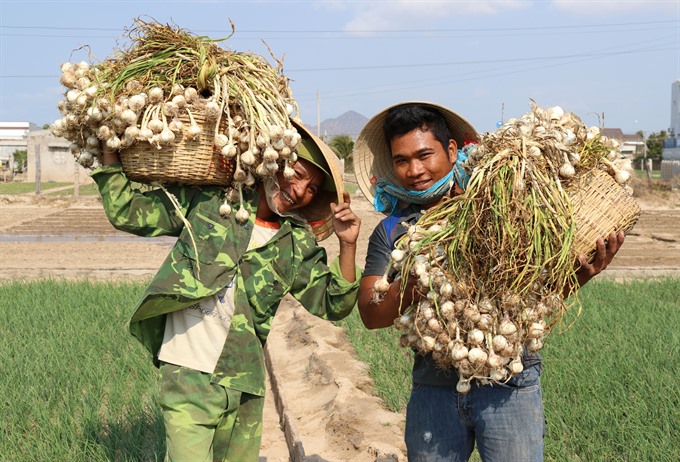 Society
Society

Lack of attention to registering brand names and geographical indications is causing difficulties to Vietnamese agricultural products, which are sometimes shut out of other markets after their names are usurped by others, a seminar heard in HCM City yesterday.
 |
| Ninh Thuận Province’s Phan Rang garlic has been granted a collective trademark. — VNA/VNS Photo Nguyễn Thành |
HCM CITY – Lack of attention to registering brand names and geographical indications is causing difficulties to Vietnamese agricultural products, which are sometimes shut out of other markets after their names are usurped by others, a seminar heard in HCM City on Wednesday.
“Việt Nam is an agricultural nation with many excellent products with the best quality in the world,” Nguyễn Hồng Lý, vice chairwoman of Việt Nam Farmers Union, said in her opening speech to the “Intellectual property rights for Vietnamese agricultural products” seminar.
“However, only a few localities, organisations and enterprises have internationally registered intellectual property rights … and only some have become internationally prestigious ones.
“Some famous Vietnamese names like nước mắm Phú Quốc (Phú Quốc fish sauce) and cà phê Ban Mê Thuột (Central Highlands coffee) have been appropriated abroad. We had to spend a lot of time and money to get them back.”
A recent survey found that in Việt Nam there are around 800 prestigious agricultural, forestry and seafood products in 720 localities but only 50 geographical indications and 140 brand names have been registered and very few like chè Thái Nguyên (Thái Nguyên tea), thanh long Bình Thuận (Bình Thuận dragon fruit) and vú sữa Lò Rèn (Lò Rèn star apple) are internationally registered.
Lý also pointed out that prestigious brand names make tracing origins easy.
“Intellectual property rights bring prestige to products and affect prices and buyers’ preferences, but Vietnamese enterprises and organisations have not focused on them.
“Farmers have no knowledge about intellectual property rights and procedures to register seem very complicated.
“We must change the situation by providing education and information about the importance of intellectual property rights and make all related authorities and farmers aware of them.
“Intellectual property rights will protect the reputation of specialities and brand names, prevent fake products, encourage diversified production, stabilise rural areas, and make users notice good products.”
Prof Võ Tòng Xuân, principal of South Cần Thơ University, spoke about the consequences of not registering to protect agricultural products.
“Seeds and techniques are stolen, and researchers do not want to invent any more and the country’s national economy suffers.”
He pointed out that many countries around the world had begun to protect intellectual property rights very early.
In 1710 the first intellectual property rights law was passed in England, he said.
The World Intellectual Property Organisation (WIPO) was set up in 1967 and the International Union for the Protection of New Varieties of Plants (UPOV) in 2001, and now the latter has 75 member nations, including Việt Nam, he said.
Xuân also talked about “bio-pirating,” a heinous act by multinational groups that scour the world for precious herbs in poor nations and patent their uses in their own names.
Many Asian and African nations have protested the fact, he said. He suggested that the WIPO and UPOV should only issue such patents when the underdeveloped countries that are being taken advantage by the multinationals give approval.
“Countries which have diverse natural resources and traditional techniques should patent them.”
To improve the intellectual property rights situation in Việt Nam, he said, “Localities should subsidise and assist farmers in registering intellectual property rights.
“Intellectual property rights and brand names would be among the most important assets for an enterprise.
“Vietnamese enterprises and organisations should pay attention to increasing the value of their brand names and protecting their intellectual property rights.” — VNS




